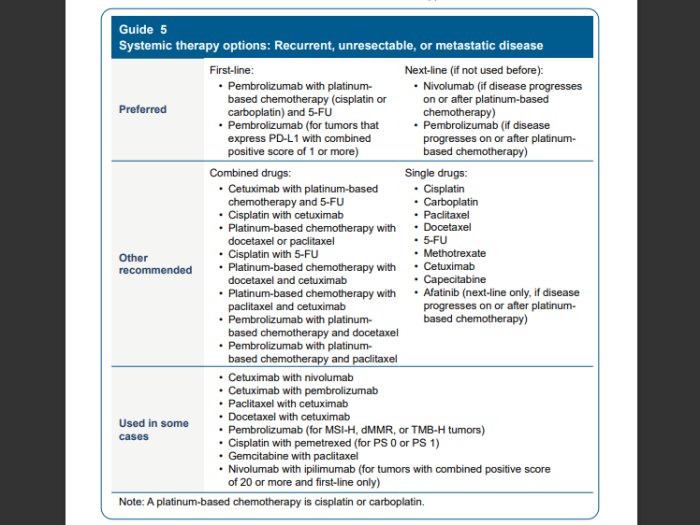Advanced Cancer: Unresectable
Advanced mouth cancer, also known as very advanced cancer, encompasses cancer that persists after treatment (persistent cancer), recurs after a period of remission (recurrence), cannot be removed surgically (unresectable), or has spread to nearby (locoregional) or distant (metastatic) sites through the bloodstream. Together with your care team, you will determine the best treatment plan for you.
Medical disclaimer: This content is for general awareness and does not replace a doctor’s consultation. For diagnosis or treatment decisions, consult a qualified specialist.
Before starting treatment for advanced or very advanced cancer, tumor mutation or biomarker testing might be conducted. Discuss how the treatment will affect your quality of life and whether the goal is to cure the cancer or to prevent its further spread.
Unresectable
An unresectable tumor cannot be removed surgically. This may be due to its proximity to vital organs, making surgery unsafe, or other health conditions that preclude surgery. Your treatment options will depend on your performance status (PS), which measures your general fitness and ability to perform daily self-care tasks, as well as your treatment preferences.
Treatments such as chemotherapy, radiation, or chemoradiation might shrink an unresectable tumor to a size where surgery becomes feasible.
Performance Status (PS) Scores and Treatment Options in India
PS 0 or 1:
- A score of 0 means you are fully active.
- A score of 1 means you can perform all self-care activities but are unable to do hard physical work.
Treatment Options for PS 0 or 1:
- Chemoradiation
- Systemic therapy followed by radiation therapy or chemoradiation (preferred systemic therapy includes docetaxel with cisplatin and 5-FU, or paclitaxel with cisplatin and 5-FU)
- Radiation therapy
PS 2:
- A score of 2 means you can do most self-care tasks and spend most of the waking time out of bed but are unable to do any work.
Treatment Options for PS 2:
- Chemoradiation (preferred)
- Radiation therapy
PS 3:
- A score of 3 means you need help with some self-care tasks and spend most of the waking time in bed.
Treatment Options for PS 3:
- Palliative radiation therapy
- Systemic therapy (refer to Guide 5)
- Best supportive care
Get Best Oral or Mouth Cancer Treatment in India.
Advanced Cancer » Recurrent or Persistent Disease » Metastatic Disease
Supportive care aims to prevent, reduce, and relieve suffering while improving quality of life. Terms like best supportive care, supportive care, and palliative care are often used interchangeably.
Recurrent or Persistent Disease
Recurrent Disease: Cancer that returns after a disease-free period.
Persistent Disease: Cancer that remains after treatment, which may have grown or spread during treatment or become resistant to it.
Treatment options for recurrent or persistent disease depend on whether you had radiation therapy before and if the tumor is resectable (can be removed with surgery) or unresectable (cannot be removed with surgery).
If Surgery is an Option
Resectable Tumor: A tumor that can be surgically removed.
Post-surgery options may include radiation therapy (RT), chemoradiation, or participation in a clinical trial (preferred in some cases). Surgery is not the only option, especially if it might affect swallowing or speaking. Alternatives include targeted therapy, immunotherapy, chemoradiation, or systemic therapy followed by RT or chemoradiation.
If Surgery is Not an Option
Unresectable Tumor: A tumor that cannot be surgically removed. In some cases, other treatments might make an unresectable tumor resectable.
Metastatic Disease
Metastatic disease refers to cancer that has spread through the bloodstream to distant parts of the body. A clinical trial is often the preferred option for metastatic disease. Treatment decisions depend on overall health, ability to perform activities of daily living (ADLs), personal treatment preferences, and the location and number of metastases. Options include systemic therapy, surgery, radiation therapy, or chemoradiation. Palliative surgery and radiation therapy, along with other supportive care, might be used to alleviate pain, discomfort, swallowing difficulties, and other side effects caused by cancer. For systemic therapy options, refer to Guide 5.

Discover the Best Oncologists and Cancer Hospitals in India
When it comes to cancer treatment, finding the right specialist and hospital can make a significant difference in the outcome. In this blog, we have compiled a list of the top oncologists and cancer hospitals across major cities in India, ensuring that you have access to the best care available.
Top Oncologists in Major Cities
For those seeking expert oncologists, we have identified the best specialists in key cities:
Leading Cancer Hospitals
In addition to finding the right specialist, choosing the right hospital is crucial for comprehensive cancer care. Here are the top hospitals in major cities:
Get more indepth information on Cancer treatments and their costs
Conclusion
Finding the right oncologist and hospital is the first step in your cancer treatment journey. Explore the links above to learn more about the top specialists and hospitals in your area.